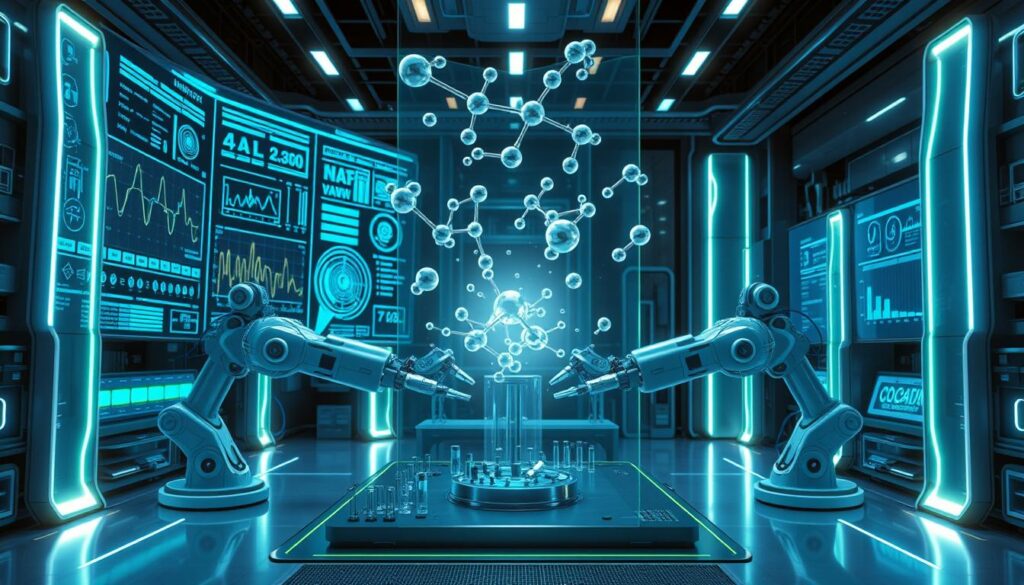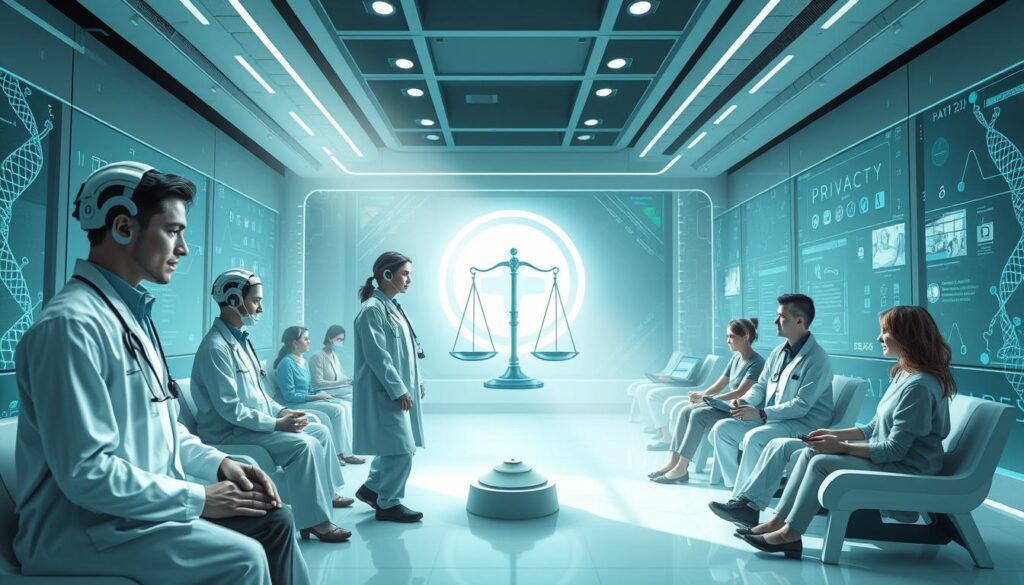Table of Contents
introduction
As a mother, I’ve always believed in personalized healthcare. Each of my children is different, needing unique care. Artificial intelligence (AI) in personalized medicine is exciting to me. It promises tailored care that could change how we manage health and disease.
The mix of personalized medicine and artificial intelligence is starting a new chapter in ai-powered healthcare. This blend of technology and data is creating tailored healthcare solutions. This article will dive into how medicine and AI are changing health understanding, diagnosis, and treatment.
Key Takeaways
- Personalized medicine uses individual data for customized care.
- AI tools help find diseases early and treat them better.
- AI speeds up making new medicines, leading to better treatments.
- Precision oncology shows how AI and personalized medicine are changing cancer care.
- It’s important to address ethical issues like data privacy and AI bias in healthcare.
The Rise of Personalized Medicine.
A new technique of treating health is gaining popularity. Personalized medicine, also known as precision healthcare. It focuses on each individual’s unique genetic, environmental, and behavioral factors. It differs from the traditional standard of handling everyone the same.
Understanding The Concept
Personalized medicine makes advantage of modern technologies such as genomic analysis. It attempts to develop therapies that are customized to each individual’s needs. Doctors can provide superior treatment if they are knowledgeable of their patients’ genetic makeup and other distinctive features.
Challenges in Traditional Healthcare
- The old way of treating health has its limits. It often uses the same treatment for everyone.
- People might not get better or could even get worse because of their genetic differences.
- This old approach can also lead to treatments that don’t work. It makes healthcare more expensive and less efficient.
Personalized medicine tries to fix these problems. It offers a more focused and patient-centered way to health care. By using data and understanding each person’s differences, doctors can give better treatments. This can lead to better health outcomes and less waste in healthcare.
| Traditional Healthcare | Personalized Medicine |
| Standardized, one-size-fits-all approach | Customized, patient-centric solutions |
| Relies on broad generalizations | Leverages individual genetic, environmental, and lifestyle factors |
| Suboptimal outcomes and adverse reactions | Improved treatment efficacy and reduced adverse effects |
| Rising healthcare costs and inefficiencies | Potential for cost savings and improved resource allocation |
Personalized medicine has the potential to revolutionize healthcare by enabling more effective, targeted, and efficient treatments tailored to individual patients.
The Role Artificial Intelligence in Medical treatment
Artificially intelligent technology (AI) is quickly changing healthcare. It makes healthcare for patients more personalized and based on data. AI detects diseases early and tailors treatment options to your specific needs.
AI analyzes a large amount of medical data using machine learning techniques. This helps in detecting patterns that individuals may overlook. As a result, powered by artificial intelligence tools for diagnosis enable clinicians to make more accurate and timely diagnoses.
AI also aids with tailored therapy. It tailors treatment strategies to your specific needs using predictive analytics. This could result in better health results and fewer adverse consequences.
AI accelerates the discovery of novel drugs. AI-driven drug discovery employs machine learning to sort through data. It replicates how medications work and accelerates the approval process.
| AI Application | Impact on Healthcare |
| AI-powered diagnostic tools | Improved accuracy and efficiency in disease detection and diagnosis |
| Personalized treatments | Tailored treatment plans based on patient-specific factors |
| AI-driven drug discovery | Accelerated drug development process and identification of promising drug candidates |
AI-Powered Diagnostic Tools
The use of artificial intelligence (AI) is affecting the way we detect problems in healthcare. These tools assist doctors to identify diseases in their early stages. This means they can start treatments earlier and provide care tailored to every individual.
- Machine Learning as an Approach in Medical Imaging: AI has made important improvements in medical scanning. It utilizes machine learning to scan images such as X-rays and Magnetic resonance imaging (MRI) rapidly and exactly. These tools detect details that doctors may overlook, allowing them to identify diseases earlier and improve treatment outcomes.
- Early Disease Detection: Finding diseases early is key in healthcare. AI tools are leading the way by spotting early signs of illness. This lets doctors start treatments early and sometimes even prevent diseases from happening.
| AI-Powered Diagnostic Capabilities | Benefits |
| Rapid analysis of medical images | Faster and more accurate diagnoses |
| Early detection of disease indicators | Timely interventions and improved patient outcomes |
| Personalized risk assessment and preventive measures | Tailored healthcare solutions for individual patients |
Medicine and AI: A Powerful Combination
The union of artificial intelligence (AI) and medicine is starting a new chapter in personalized healthcare and innovative treatments. This powerful mix is changing how we see medical care. It’s making treatments more precise and tailored for each patient.
AI in medical treatments is changing the game with advanced diagnostic tools. Machine learning algorithms can look through huge amounts of medical data. This includes scans and genetic info to spot diseases early. Thanks to precision medicine with AI, doctors can diagnose faster and more accurately. This leads to better and more personal treatment plans.
AI-powered healthcare innovation is also speeding up drug discovery and development. AI can quickly go through huge libraries of compounds to find new drugs. This makes the long clinical trial process shorter. It could mean life-saving treatments reach patients sooner than before.
AI is not just a tool, but a strategic partner in the quest to revolutionize healthcare and improve patient outcomes
AI-powered therapy customization
Artificial intelligence (AI) is transforming healthcare by customized treatment strategies. It breaks from the traditional universal strategy by utilizing statistical analysis to predict outcomes. Treatments are now customized according to each patient’s particular needs.
Predictive analysis in Medical treatment
Predictive analytics is an important element of artificial intelligence in healthcare services. It analyzes vast amounts of information about patients using powerful algorithms. Medical history, genetics, lifestyle, and additional variables are all considered.
AI can estimate how well various treatments will work by detecting patterns in the data. This allows doctors to make better decisions and provide patients with the care that is most effective for them.
- Personalized treatment plans based on individual patient data
- Predictive algorithms that analyze complex healthcare data to identify optimal treatments
- Improved patient outcomes through targeted, AI-driven healthcare solutions
AI is making a big difference in healthcare. It helps doctors give treatments that really work for each patient. This means better results and fewer bad reactions. It’s a big step towards making medicine more personal and effective.
AI-Powered Drug Research and Development
AI is changing how we find and create new medicines in the quickly changing healthcare industry.
AI algorithms help find new drug candidates faster. They also improve drug formulas and clinical trials.

Accelerating the Drug Development Process
The old way of making drugs is slow and costly. But, ai in drug discovery and ai-driven drug development are changing this. AI systems quickly go through lots of data to find good drug targets. They also guess how well drugs will work and if they’re safe.
With ai-driven drug development, companies can make drugs faster. This means patients get treatments sooner. It’s good for the healthcare world and meets the need for ai in personalized medicine.
AI is poised to transform the pharmaceutical industry, enabling more efficient drug discovery and development processes that can ultimately lead to better treatments for patients.
Personalized Healthcare and Precision Oncology
Individualized medicine is changing medical care, with precision oncology at the cutting edge. AI enables doctors to deliver those with cancer with successful therapies. This produces superior outcomes with fewer adverse effects.
AI techniques help doctors better comprehend cancers. They can see what makes a cancer distinct. This allows them to tailor therapy to each patient’s specific needs.
| Benefit | Impact |
| Improved Accuracy in Tumor Profiling | Allows for specific treatment strategies aimed at the specific genetic and molecular causes of a person’s cancer. |
| Personalized Treatment Plans | Treatments are personalized to the patient’s particular cancer profile, leading to better medicines and fewer adverse effects |
| Accelerated Drug Discovery and Development | AI algorithms can help identify prospective medication targets and test new medicinal molecules, accelerating the overall drug development process. |
The future of cancer care is bright, thanks to AI and personalized medicine. Together, they promise treatments that are more effective and kinder. This will improve life for cancer patients and help in the fight against the disease.
Precision oncology is the future of cancer care, and AI is the key to unlocking its full potential.
Ethical Considerations and Challenges
AI in healthcare is growing fast, but we must face its ethical sides. We worry about data privacy and security. Also, there’s a fear of bias and unfairness in AI healthcare systems.
Data Privacy and Security
AI uses a lot of sensitive medical data, making privacy and security big concerns. Patients need to trust that their info is safe. We must create strong privacy and security rules for AI in healthcare.
Bias and Fairness in AI Systems
AI can make old biases worse, leading to unfair health care. Things like gender, race, and where you live can affect AI’s choices. We need to fix these biases to make AI fair for everyone.
To solve these problems, healthcare needs to focus on making AI that respects privacy and fairness. Working together is key. Doctors, AI experts, and ethicists must team up to make AI in healthcare right and fair.

The integration of AI in healthcare holds immense promise, but we must address the ethical implications to ensure the responsible and equitable use of these technologies.
The Future of AI in Personalized Medicine.
AI and tailored medicine promise to brighten the future of healthcare. AI is set to improve healthcare. It will improve the precision, efficiency, and individualization of care for each patient.
Using AI in Clinical Practice
Tools based on artificial intelligence are becoming growing in importance in healthcare. Doctors can benefit from machine learning and analytics that predicts. This improves diagnostic and treatment techniques for each patient.
AI is improving healthcare precision and personalization. Analyzing patient data allows clinicians to make better decisions. This leads to more effective therapy for individual patients.
